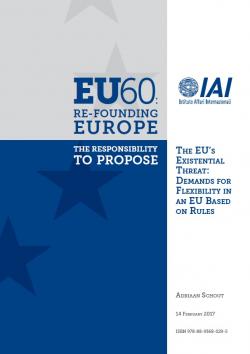The EU's Existential Threat: Demands for Flexibility in an EU Based on Rules
Deeper integration is on the agenda to complete the monetary union, to get growth back on track, and to rebuild trust in the EU. It will involve a political union with a fiscal capacity, and it will probably turn EU institutions into state-like bodies. Such centralization might put the integrity of the EU at stake by creating public resistance and a disparity between Euro-ins and Euro-outs. It is also doubtful whether it ensures the long-term competitiveness of the Eurozone. This paper starts from the assumption that the need for a political union results from the inabilities of some national governments to reform and to respect agreed upon rules. It is apparently easier to discuss reforming the Eurozone than to reform a country’s own institutions (“integration by default”). If the root-cause of the Euro crisis lies at the level of member states, then that is where reforms should start. This paper argues that countries unwilling or unable to reform should not demand flexibility on EU-rules, but should instead leave the Union altogether.
Paper prepared within the context of “EU60: Re-Founding Europe. The Responsibility to Propose”, an initiative launched by the Istituto Affari Internazionali (IAI) and the Italian Ministry of Foreign Affairs and International Cooperation (MAECI), in cooperation with the Centro Studi sul Federalismo (CSF) and in the framework of IAI’s strategic partnership with the Compagnia di San Paolo, on the occasion of the 60th Anniversary of the Treaties of Rome.
-
Details
Roma, IAI, February 2017, 15 p. -
ISBN/ISSN/DOI:
978-88-9368-029-5
Introduction: 60 years of integration
1. Deeper integration?
2. Regaining trust, but at what level?
3. European integration by default
Conclusions and way forward
References
Topic
Tag
Related content
-
Ricerca19/09/2016
EU60: Re-Founding Europe. The Responsibility to Propose
leggi tutto



